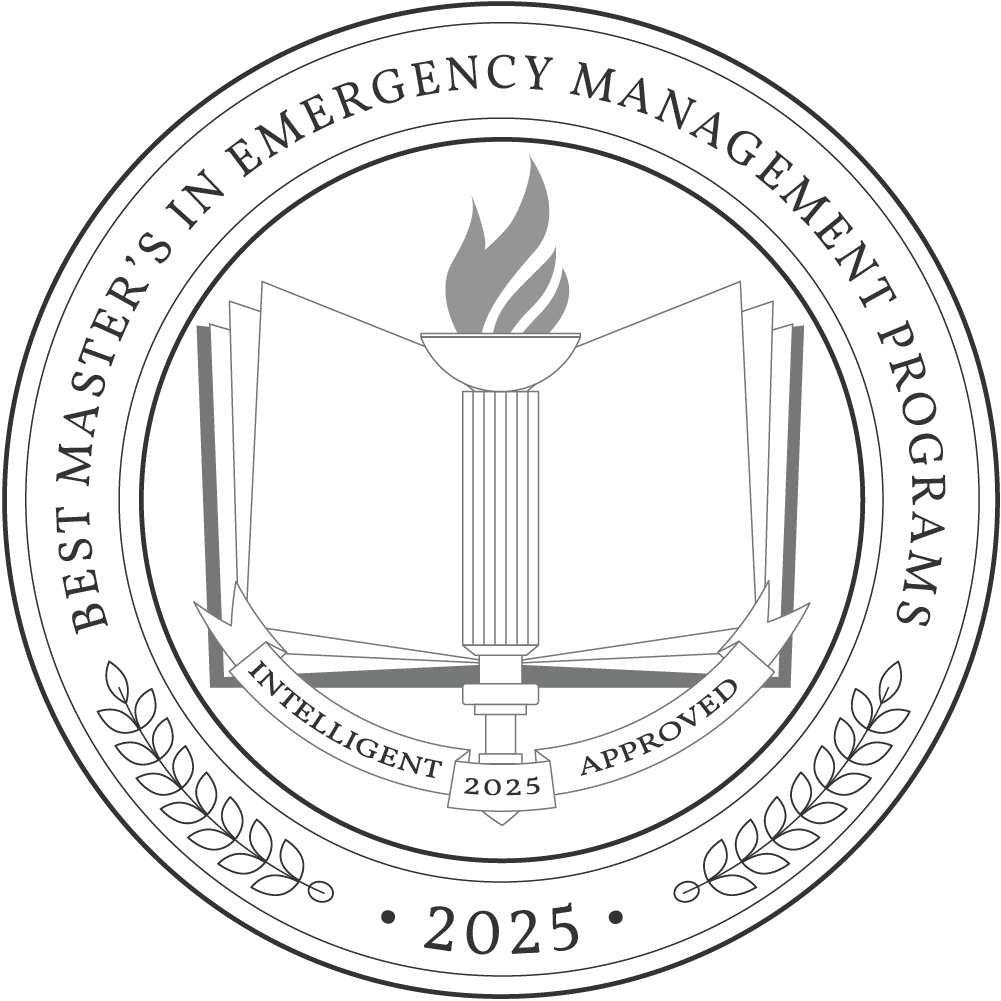A master’s degree in emergency management equips students to take on high-level roles in disaster response and recovery, including homeland security officer, public safety director, nuclear emergency planner, and emergency management director. Students graduate with a thorough understanding of disaster preparedness, mitigation, and response. Government agencies, non-profits, hospitals, and private sector companies are the top employers of graduates.The median annual salary of an emergency management director is $79,180, but it will vary depending on the industry and location. Those in the professional and technical services industry have the highest median salary of $106,000 annually, while those in state government have the lowest median wage of $66,750. Graduates with the highest education level and relevant work experience will have the strongest job prospects.
Most master’s degrees in emergency management require two years of full-time study to graduate, with programs consisting of 30 to 46 credits. The average annual cost is $19,749 for tuition and fees. Students living on-campus will incur higher annual housing and living expenses costs.
Why Trust Us
The Intelligent.com Higher Education Team is dedicated to providing students with independent, equitable school and program rankings and well-researched resources. Our expert-driven articles cover topics related to online colleges and programs, paying for school, and career outlooks. We use data from the U.S. Department of Education’s College Scorecard, the National Center for Education Statistics, and other reputable educational and professional organizations. Our academic advisory team reviews content and verifies accuracy throughout the year for the most current information. Partnerships do not influence rankings or editorial decisions.
- Analyzed over 2,000 national, accredited, and nonprofit colleges and universities
- 800+ rankings pages are reviewed and updated yearly
- Content is informed by reputable sources, surveys, and interviews with academic advisors and other experts
- Over 100 data points are reviewed for accuracy and quality throughout the year, including sources
How we rank schools
Our list features the best Master’s in Emergency Management degree programs at top colleges nationwide. Each school featured is a nonprofit, accredited institution — either public or private — with a high standard of academic quality for post-secondary institutions.
We evaluated each school’s program on tuition costs, admission, retention and graduation rates, faculty, reputation, and the student resources provided for online students. We collected data from trusted sources like the National Center for Education Statistics, individual school and program websites, school admissions counselors, and other data sources. Then, we calculated the Intelligent Score on a scale of 0 to 100 based on the following criterion:
Academic Quality:
- Admission rate versus enrollment rate
- Retention rate of students who return after year one
- Accreditation status (regional and programmatic)
- Nonprofit status, both private and public institutions
Graduation Rate
- Overall graduation rate
- Total number of currently enrolled students, including diversity metrics
- Student-to-faculty ratio
Cost and ROI
- In-state and out-of-state per-credit tuition rates and fees
- Required credits to graduate
- Earning potential after graduation
- Availability of federal student loans, scholarships, and other financial aid options
Student Resources
- Available student services for online-only and hybrid programs
- On-campus amenities like tutoring centers and the number of libraries
Read more about our ranking methodology.
Best 14 Accredited Master’s in Emergency Management Degree Programs
FiltersInstitution Type
Status
- Intelligent Score
- Alphabetically By University Name
- Acceptance Rate
- Enrollment
- In-state Graduate Tuition
- Out-of-state Graduate Tuition
- In-state Undergraduate Tuition
- Out-of-state Undergraduate Tuition

Georgetown University
Intelligent Score: 99.53In-state: $57,384
Out-of-state: $57,384
In-state: $53,136
Out-of-state: $53,136
SAT: 1380-1550
ACT: 31-35
$1,573
On-Campus, Online
Middle States Commission on Higher Education
33

Thomas Jefferson University
Intelligent Score: 99.46In-state: $40,680
Out-of-state: $40,680
In-state: $21,420
Out-of-state: $21,420
SAT: 1090-1270
ACT: 20-27
$796
On-Campus, Online
Middle States Commission on Higher Education
36

Jacksonville State University
Intelligent Score: 98.75In-state: $9,720
Out-of-state: $19,440
In-state: $9,600
Out-of-state: $9,600
SAT: 840-1070
ACT: 18-24
In-State: $422
Out-of-State: $686
On-Campus, Online, Hybrid
Network of Schools of Public Policy, Affairs, and Administration
39

Northeastern University
Intelligent Score: 97.86In-state: $54,360
Out-of-state: $54,360
In-state: $25,264
Out-of-state: $25,264
SAT: 1410-1540
ACT: 33-35
$884
On-Campus, Online
New England Commission of Higher Education
30

Arkansas Tech University
Intelligent Score: 97.45In-state: $5,568
Out-of-state: $11,136
In-state: $5,256
Out-of-state: $5,256
SAT: N/A
ACT: N/A
$314
On-Campus, Online, Hybrid
Higher Learning Commission
36

North Dakota State University
Intelligent Score: 97.26In-state: $8,606
Out-of-state: $12,909
In-state: $7,013
Out-of-state: $7,013
SAT: 1028-1243
ACT: 20-26
Resident: $421
Non-Resident: $632
On-Campus
Higher Learning Commission
39

Arizona State University
Intelligent Score: 94.78In-state: $10,710
Out-of-state: $28,800
In-state: $11,720
Out-of-state: $11,720
SAT: 1100-1320
ACT: 21-28
Resident: $897
Non-Resident: $1,472
On-Campus, Online
Higher Learning Commission
33

National University
Intelligent Score: 93.96In-state: $13,320
Out-of-state: $13,320
In-state: $15,480
Out-of-state: $15,480
SAT: N/A
ACT: N/A
$442
On-Campus, Online
Western Association of Schools and Colleges Senior College and University Commission
36

University of Delaware
Intelligent Score: 93.09In-state: $12,730
Out-of-state: $34,160
In-state: $34,164
Out-of-state: $34,164
SAT: 1150-1330
ACT: 25-30
$1,028
Hybrid
Middle States Commission on Higher Education
30-33

Florida International University
Intelligent Score: 92.84In-state: $4,721
Out-of-state: $16,529
In-state: $8,912
Out-of-state: $8,912
SAT: 1110-1260
ACT: 23-29
In-State: $455
Out-of-State: $1,001
On-Campus, Online, Hybrid
Southern Association of Colleges and Schools Commission on Colleges
30

Eastern Kentucky University
Intelligent Score: 92.23In-state: $9,266
Out-of-state: $19,338
In-state: $9,900
Out-of-state: $9,900
SAT: 950-1170
ACT: 19-25
Resident: $572
Non-Resident: $780
On-Campus, Online
Southern Association of Colleges and Schools Commission on Colleges
36

The University of Texas Rio Grande Valley
Intelligent Score: 91.38In-state: $11,448
Out-of-state: $40,032
In-state: $12,028
Out-of-state: $12,028
SAT: 1210-1470
ACT: 26-33
Resident: $598 - $741
Non-Resident: $1,008 - $1,159
On-Campus, Online
Southern Association of Colleges and Schools Commission on Colleges
36

University of Alaska Fairbanks
Intelligent Score: 90.82In-state: $27,590
Out-of-state: $44,590
In-state: $29,182
Out-of-state: $29,182
SAT: 1110-1360
ACT: 17-27
Resident: $539
Non-Resident: $1,105
On-Campus, Online, Hybrid
Northwest Commission on Colleges and Universities
30

University of New Haven
Intelligent Score: 89.93In-state: $40,170
Out-of-state: $40,170
In-state: $17,370
Out-of-state: $17,370
SAT: 1050-1220
ACT: 22-28
$1,055
On-Campus, Online, Hybrid
New England Commission of Higher Education
36
How to Choose a Master’s in Emergency Management Program
Choose your area of study
Consider your interests and career goals, and choose the program that best aligns. Master’s of emergency management programs often fall into five categories:
- Disaster relief
- Homeland security
- Public administration
- Fire science
- Child protection
For example, if you’re interested in working in homeland security, consider a Master of Arts in homeland security. Some schools also offer a Master of Science in emergency management, which covers all emergency management categories. This degree is best for students who need more clarification on their specialized field or want to leave their options open.
Research schools and programs
As you narrow your options, apply to emergency management programs from accredited institutions. Accreditation ensures that these schools meet a set quality standard that employers and other institutions recognize. You’ll have an easier time transferring credits, getting hired, and receiving financial aid.
Check that the master’s in emergency management program you’re applying to is accredited. Program accreditation ensures the curriculum meets quality standards and adequately prepares students for their careers. You can use the Database of Accredited Postsecondary Institutions and Programs (DAPIP) to check on a school’s accreditation status.
You can learn more about prospective schools and programs by visiting their website, attending open houses, browsing social media, or visiting the school in person. You can also speak with an admissions counselor to learn more about the program and school culture.
Prepare for tests and applications
Application requirements for a master’s degree in emergency management vary by institution but typically include previous school transcripts, a resume, a personal statement, GRE or GMAT scores, and letters of recommendation from professors or employers.
Keep an eye on the admission deadline for the programs you’re interested in, and make sure you have all materials gathered and submitted before the date approaches. Also, speak with an admissions counselor to ensure you understand the application process and meet all requirements.
Select your program
As you refine your options and determine the school and program that best fits your academic and lifestyle needs, consider the following:
- Is the program part-time or full-time?
- Do they have housing options?
- Is online learning an option?
- What’s the cost of the program?
- How long will the program take to complete?
Choose the program that will set you up for success. If you’re having trouble, speak with an academic advisor to review your options and find the best choice.
Determine how you’ll pay for your degree
Financial considerations will help you determine your program selection. Create a budget that includes all your expenses during your degree, including tuition, fees, housing, food, transportation, and supplies. Based on this budget, determine whether you can pay for the degree yourself or if you’ll need financial assistance.
Visit the Free Application for Federal Student Aid (FAFSA) website and fill out the form to determine the amount of financial aid you’re eligible for, including grants, scholarships, work-study programs, and loans. Due to the essential service of those in the emergency management field, you may also be eligible for employer tuition assistance or tuition waivers for first responders.
What Can You Expect From a Master’s in Emergency Management Program?
A master’s degree in emergency management offers students a thorough understanding of disaster preparedness, processes, and relief. Students graduate with the communication, technical, and critical thinking skills needed to succeed in the field. Most two-year programs include core and elective classes covering emergency preparedness, terrorism, homeland security, ethics, and hazard mitigation.
Students will use various learning methods during the program, including coursework, exams, lectures, internships, and case studies. Many programs conclude with a thesis that combines the knowledge learned throughout the program or a practicum that allows students to gain real-world experience in the field.
Potential courses you’ll take in a master’s in emergency management program
- Health Care Issues and Policies Related to Disaster Preparedness and Emergency Management. Students study the formulation, implementation, and evaluation of current government and institutional policies related to emergency management and disaster preparedness.
- Radiological Emergencies. Students learn how to respond to a radiological incident, with topics including radiological concepts, response team operations, commercial nuclear power facilities, plume modeling, radiological instrumentation, and decontamination.
- Crisis Communication in Disaster Preparedness and Emergency Management. This course evaluates communication strategies before, during, and after a disaster. Students will analyze private and public information exchanges, including social media use.
- Epidemiology of Disasters. Students will study the health effects of natural and human disasters. They will cover the factors contributing to these effects, the needs of affected populations, and the resources used to prevent continued adverse health effects.
- Vulnerable Populations in Disasters. This course analyzes how disasters affect vulnerable populations. Students will learn about the characteristics of these populations and determine the planning, mitigation, response, and recovery processes needed to mitigate further effects.
Master’s in Emergency Management Degree Frequently Asked Questions
How do I apply to a master's in emergency management degree program?
The application requirements for a master’s degree in emergency management often consist of:
- Undergraduate transcripts
- GRE or GMAT test scores
- A resume
- Letters of recommendation
- A personal statement
Talking to an admissions counselor before applying is essential to ensure you have all the required materials and understand the application process.
How much does a master's in emergency management degree cost?
The average annual cost for a master’s degree in emergency management is $19,749, but it will vary depending on the program, school, and supplies needed. If you plan to live on campus, housing, food, transportation, and other living expenses will increase that amount. Online or part-time students will likely see a lower annual cost.
How long does it take to earn a master's in emergency management degree?
Most master’s programs in emergency management require 30 to 46 credits to graduate. The majority of students complete this in two years of full-time study. However, some schools offer online, part-time, or accelerated programs, allowing you to complete the program at your chosen pace.

